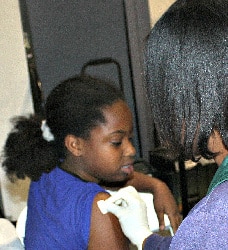Haiti Receives 10-Year Commitment from International Community
By Stephen Kaufman
Washington — Countries and international organizations that will pledge money to help Haiti recover from the January 12 earthquake have agreed to hold a donors conference in New York in March and have declared a 10-year commitment to the country. The needs in Haiti are immense, and the Haitian people are continuing to suffer despite the massive aid and relief effort that mobilized as a result of the disaster, they say.
At the Haiti Ministerial Preparatory Conference in Montreal January 25, the government of Haiti and key donors and partners, including the United States, Canada, Brazil, the European Union, Spain and France, agreed to respect the sovereignty of the Haitian government and people in the joint reconstruction and development effort, and align their priorities with those established by the government of Haiti.
According to the chairman’s statement, released January 25, the conference attendees declared that “Haitians own their future,” and pledged to stand with Haiti for the long term.
“An initial 10-year commitment is essential, as is a concerted effort to build Haiti’s capacity. Sustainable development, including environmental sustainability, climate resilience, disaster risk reduction and emergency preparedness, will be a cornerstone of our joint approach,” the statement says.
It also calls for “mutual transparency and accountability” in deciding how to allocate and manage resources, and to build “effective, accountable and transparent democratic institutions able to deliver basic services and to protect and promote human rights.”
In her remarks at the conference, Secretary of State Hillary Rodham Clinton said it is “important that we see ourselves as partners with Haiti — not patrons.”
The United States will support the Haitian government “so that this is truly a Haitian-led effort, one that responds to the aspirations and the needs of the Haitian people,” she said.
The secretary said that ahead of the donors conference in New York, the pledging countries and organizations have decided to hold technical meetings to do a needs assessment and plan coordination ahead of declaring how much money they will give in March. She said this approach will add to donor confidence.
“We’re trying to do this in the correct order,” she said. “Sometimes people have pledging conferences and pledge money [but] they don’t have any idea what they’re going to do with it.”
Haiti is still in an emergency, and Clinton cited Haitian Prime Minister Jean-Max Bellerive’s statement in Montreal that not all of the Haitian people are currently being fed, given water, or receiving medical treatment. In addition, many need shelter, and amputees need prosthetic limbs.
“We are committed to … doing this in a way that builds confidence in the international community and among donor states and donor organizations and individuals,” she said.



